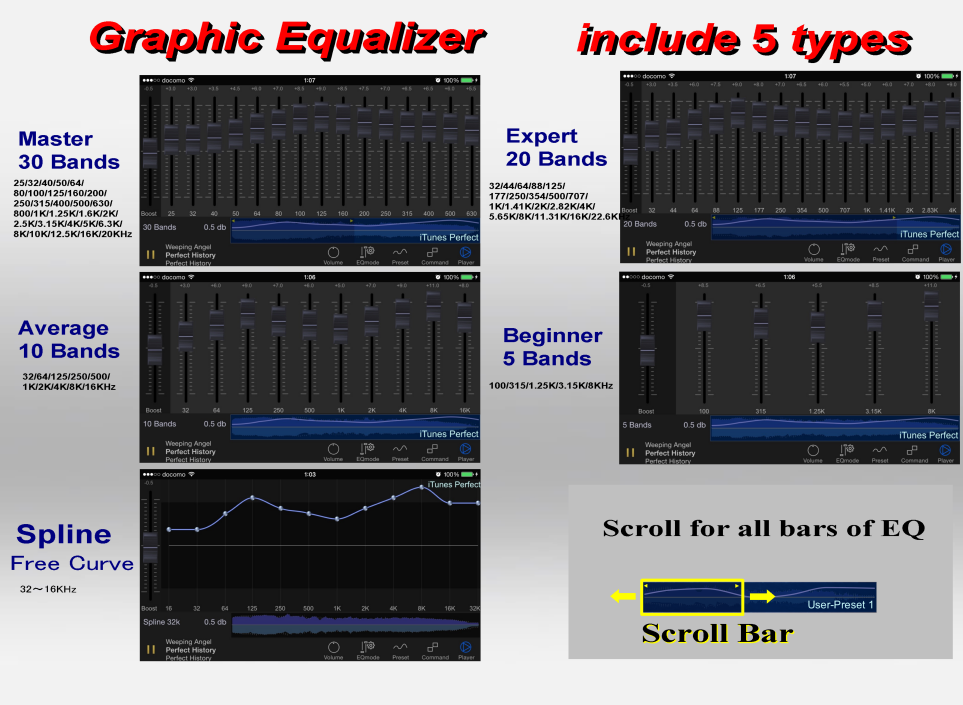

However, you can always improve your audio experience by tweaking the settings according to the genres of music you’re listening at the moment and also according to your speaker’s capabilities. It’s important to understand that usually, equalizers are set flat so you can hear the sound as it was originally recorded. Now that you understand the frequency ranges you’ll be able to see an equalizer and understand how it works and test some settings yourself. We need trebles to reproduce these high-frequency sounds.

8,000 Hz and above: Theoretically we can hear up to 20,000 Hz, yet most humans have limited hearing capabilities due to age and other factors.It’s a spectrum where you can enjoy the music if done well, but many times it can be very annoying too. This is played in the upper range of instruments such as guitars or violins. 3,000 Hz – 8,000 Hz: Upper mid-range frequencies.Most instruments such as guitars and pianos are played in this range. This is the range we are used to hearing and also vocal sounds are located in this range. 600 Hz – 3,000 Hz: Mid-range frequencies.If you play the lower end of many musical instruments such as guitars or a piano you’ll hear this range of frequencies. 200 Hz to 600 Hz: Low mid-range frequencies.60 Hz to 200 Hz: Low frequencies requiring a bass or lower drums to be reproduced.Only sub-bass and kick drums reproduce these frequencies and you need a subwoofer to hear them, or a good pair of headphones. 20 Hz – 60 Hz: Super low frequencies on the EQ.That’s why you always see small speakers around your surround sound but a huge bass speaker to give some punch. Low-frequency sounds require more power and bigger speakers, while higher frequency sounds require less power and smaller speakers. To put it simply, if you have a low-frequency sound, you’ll hear waves in the bass or sub-bass range. An example of a digital equalizer is shown below: What are frequency ranges?įrequency in “ audio” terms is the number of times a wave repeats itself in a lapse of time. You can also find equalizers in most stereo sound systems, Blu Rays, Smart TVs, Car stereos, etc. to allow you to adjust your audio settings and get the most out of your speakers. It usually works with frequencies between 20 Hz up to 20,000 Hz, which are theoretically the frequencies humans can hear, although in reality our range could be decreased by age and other factors.ĭecades ago, equalizers were managed via a physical console were you could tune up and down levers to adjust your settings, but since most audio is consumed in a digital way nowadays, equalizers have been implemented in most devices such as computers, smartphones, etc. What’s an Equalizer (EQ)?Īn equalizer is a processor that allows you to boost or decrease certain frequency ranges to modify or enhance the sound quality. The best settings depend on your hearing capabilities, the quality of your speakers, and even the type of music your listening to.īut first of all, let’s go over the basics as you will need to know this information to keep up with the rest of the article. Because no, there isn’t a perfect equalizer setting for everybody no matter what other people think. In this article, we’ll help you understand a few things to help you find the perfect setup for your speakers and genres of music. The script could not handle all the hundreds of genere changes doing that time span.Have you ever asked yourself “ what are the best equalizer settings?” after diving deep into the audio settings of your favorite music device trying to understand how it works or trying to discover if there’s a magical configuration that gives you the best sound for your money no matter what speakers you’re rocking? Maybe the script will work for you as long as you play music, me it did not. If you have a song with out a genera listed monkey calls it unknown so you need one for that also. Then use the script EQ Auto Presets i think is the name it was made by diddeleedoo, and its still in the script forum room.īut the script needs the presets to be the same name as the genere same spelling will keep it from crashing. but now and then they both try to use the same block of ram. something just keeps trying to run at the same time the script does which is able to be done. There was a script for it in the scripting forum how ever under heavy testing of it on my mm 2.5 in win 98 and on this xp mm 2.5 the script keeps crashing after a given amount of time. how ever you could save it to your own named preset also. You set up the eq, and saved it per song to the genera you wanted.


 0 kommentar(er)
0 kommentar(er)
